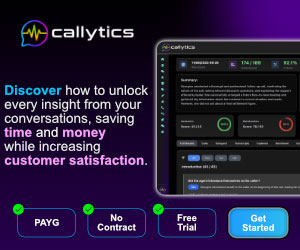In this thought leadership article, Lee Cottle at Playvox explores how managers manage in remote working environments.
More than ever, customer service professionals are opting to work from home for safety, convenience, or simply preference. While the option of operating remotely can be attractive for agents, it presents a series of new challenges for managerial teams. So how can you stay on top of your team?
Research from the Office of National Statistics released in June shows that from 2019 to 2020 the proportion of employees working from home rose to 37% from 27% in 2019. But within these statistics, just 3.8% of the UK’s contact centre agents were working from home before rising to 5.1% this year.
This may sound like a small percentage, but it accounts for thousands of agents serving customers around the world. Here are some top tips from us to help you keep your team ticking.
Implement a Clear Strategy and Set Expectations
Research from ONS shows that remote workers complete almost double the amount of unpaid overtime than those based in an office. Six hours vs 3.6 hours in total. Although agents may feel like they are helping the company here, it is easy for burnout to catch up, leaving you with a demoralised and tiring workforce.
Therefore, if you do not already have a clear handbook on what is and is not expected from your remote workers, it is time to do so now. A few key areas to include are:
- Working hours
- Lines of hierarchy for assistance
- Access to information banks
- Preparing an efficient home office
- An outline of tools they will be using
It can be easy for an agent to lose their way at home without their colleagues sitting nearby to bounce ideas off or solve challenges together. Laying out the responsibilities and expectations your agents are expected to adhere to as they first commence their remote life is a good way to subvert possible problems in the future
Arrange Social Events for In-Person and Virtual Attendees
A recurring theme over the past 18 months is the issue of remote worker isolation. In a late-2020 research report surveying 3,500 remote workers, 20% said they felt a struggle with loneliness. An agent struggling with any issue is likely to lead to a drop in productivity at work.
Regular check-ins on your whole team could unveil any possible issue with this, but when the whole force is working from home it is unlikely to be an individual problem. Therefore taking the time for regular scheduled non-work focused group meetings is a necessity to not only keep the team engaged, but to maintain bonds between your agents.
During working hours you could introduce game hours, virtual movie watchalongs, or a simple hangout to chat about life outside the contact centre.
Welcome Customer Feedback
Contact centres exist to serve the customers interacting with their agents. Solving problems, turning angry callers into pacified supporters of the company. So when you switch to a new style of operating the most important piece of feedback to obtain is that of the customers.
To achieve this, however, you must tread lightly. For callers already with little time the last thing they will want to do at the end of a call is stick around even longer for a survey. Instead wait a day or two before reengaging with those who have been in contact asking for their assistance. You may want to offer an incentive for their time and views to gain a wider array of responses.
Email surveys are by far the most preferred form of contact, and research from Statista shows 51% of people prefer this method while just 2% say a phone call is their favoured form. Take this into account when asking for feedback, you are far more likely to receive a positive response from an email that is not as time sensitive as a call.
Introduce QA Software to Monitor and Boost Productivity
Quality assurance is a fundamental part of managing contact centre agents effectively. Without knowing where your agents are starting from you cannot help their journey to improvement.
Specialist QA software allows you to discreetly monitor agents’ work while identifying their strengths and weaknesses. It is a better route for you, your agents, and the customers they are assisting and importantly for supervisors and managers to take a proactive approach to employee skill building rather than waiting for complaints or mistakes to learn from.
Providing coaching on a one-to-one or one-to-many basis, also helps free up time to look at personal development opportunities. Building these training programs using insights gained from specialist software helps construct meaningful courses that are unique to each agent.
With this more focused approach, including seamless insertion into the working day via the QA’s monitoring, agents are far more likely to take on new information rather than gloss over a generic training manual.

Lee Cottle
It has been often said that the past 18 months are like nothing the world of work has witnessed in the past, and it is true.
But as we enter the post-Covid era, the world of customer service is diverging. A hybrid era consisting of remote workers and contact centre-based agents. As a team leader it is your responsibility to see this transition smoothly, in a manner that benefits your agents and your customers.
Author: Guest Author
Published On: 27th Sep 2021 - Last modified: 23rd Apr 2024
Read more about - Guest Blogs, Lee Cottle, Playvox




































